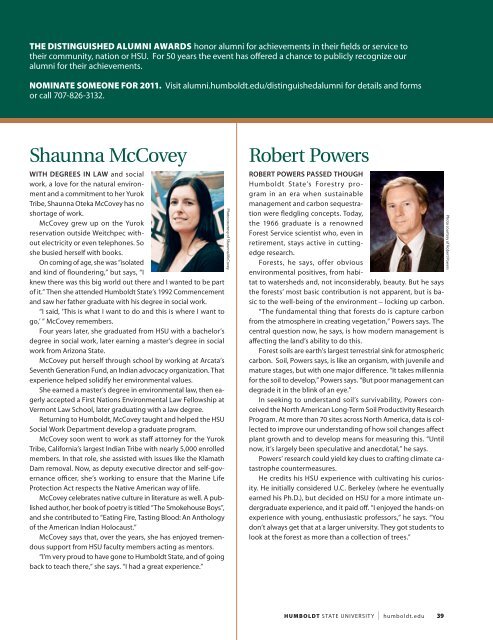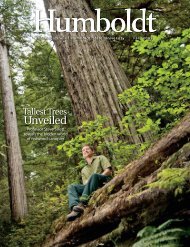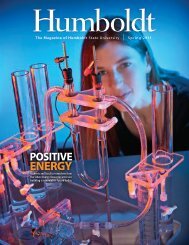Download Now - Humboldt Magazine - Humboldt State University
Download Now - Humboldt Magazine - Humboldt State University
Download Now - Humboldt Magazine - Humboldt State University
Create successful ePaper yourself
Turn your PDF publications into a flip-book with our unique Google optimized e-Paper software.
THE DISTINGUISHED ALUMNI AWARDS honor alumni for achievements in their fields or service to<br />
their community, nation or HSU. For 50 years the event has offered a chance to publicly recognize our<br />
alumni for their achievements.<br />
Visit alumni.humboldt.edu/distinguishedalumni for details and forms<br />
or call 707-826-3132.<br />
Shaunna McCovey<br />
WITH DEGREES IN LAW and social<br />
work, a love for the natural environment<br />
and a commitment to her Yurok<br />
Tribe, Shaunna Oteka McCovey has no<br />
shortage of work.<br />
McCovey grew up on the Yurok<br />
reservation outside Weitchpec without<br />
electricity or even telephones. So<br />
she busied herself with books.<br />
On coming of age, she was “isolated<br />
and kind of floundering,” but says, “I<br />
knew there was this big world out there and I wanted to be part<br />
of it.” Then she attended <strong>Humboldt</strong> <strong>State</strong>’s 1992 Commencement<br />
and saw her father graduate with his degree in social work.<br />
“I said, ‘This is what I want to do and this is where I want to<br />
go,’ ” McCovey remembers.<br />
Four years later, she graduated from HSU with a bachelor’s<br />
degree in social work, later earning a master’s degree in social<br />
work from Arizona <strong>State</strong>.<br />
McCovey put herself through school by working at Arcata’s<br />
Seventh Generation Fund, an Indian advocacy organization. That<br />
experience helped solidify her environmental values.<br />
She earned a master’s degree in environmental law, then eagerly<br />
accepted a First Nations Environmental Law Fellowship at<br />
Vermont Law School, later graduating with a law degree.<br />
Returning to <strong>Humboldt</strong>, McCovey taught and helped the HSU<br />
Social Work Department develop a graduate program.<br />
McCovey soon went to work as staff attorney for the Yurok<br />
Tribe, California’s largest Indian Tribe with nearly 5,000 enrolled<br />
members. In that role, she assisted with issues like the Klamath<br />
Dam removal. <strong>Now</strong>, as deputy executive director and self-governance<br />
officer, she’s working to ensure that the Marine Life<br />
Protection Act respects the Native American way of life.<br />
McCovey celebrates native culture in literature as well. A published<br />
author, her book of poetry is titled “The Smokehouse Boys”,<br />
and she contributed to “Eating Fire, Tasting Blood: An Anthology<br />
of the American Indian Holocaust.”<br />
McCovey says that, over the years, she has enjoyed tremendous<br />
support from HSU faculty members acting as mentors.<br />
“I’m very proud to have gone to <strong>Humboldt</strong> <strong>State</strong>, and of going<br />
back to teach there,” she says. “I had a great experience.”<br />
Photo courtesy of Shaunna McCovey<br />
Robert Powers<br />
ROBERT POWERS PASSED THOUGH<br />
<strong>Humboldt</strong> <strong>State</strong>’s Forestry program<br />
in an era when sustainable<br />
management and carbon sequestration<br />
were fledgling concepts. Today,<br />
the 1966 graduate is a renowned<br />
Forest Service scientist who, even in<br />
retirement, stays active in cuttingedge<br />
research.<br />
Forests, he says, offer obvious<br />
environmental positives, from habitat<br />
to watersheds and, not inconsiderably, beauty. But he says<br />
the forests’ most basic contribution is not apparent, but is basic<br />
to the well-being of the environment – locking up carbon.<br />
“The fundamental thing that forests do is capture carbon<br />
from the atmosphere in creating vegetation,” Powers says. The<br />
central question now, he says, is how modern management is<br />
affecting the land’s ability to do this.<br />
Forest soils are earth’s largest terrestrial sink for atmospheric<br />
carbon. Soil, Powers says, is like an organism, with juvenile and<br />
mature stages, but with one major difference. “It takes millennia<br />
for the soil to develop,” Powers says. “But poor management can<br />
degrade it in the blink of an eye.”<br />
In seeking to understand soil’s survivability, Powers conceived<br />
the North American Long-Term Soil Productivity Research<br />
Program. At more than 70 sites across North America, data is collected<br />
to improve our understanding of how soil changes affect<br />
plant growth and to develop means for measuring this. “Until<br />
now, it’s largely been speculative and anecdotal,” he says.<br />
Powers’ research could yield key clues to crafting climate catastrophe<br />
countermeasures.<br />
He credits his HSU experience with cultivating his curiosity.<br />
He initially considered U.C. Berkeley (where he eventually<br />
earned his Ph.D.), but decided on HSU for a more intimate undergraduate<br />
experience, and it paid off. “I enjoyed the hands-on<br />
experience with young, enthusiastic professors,” he says. “You<br />
don’t always get that at a larger university. They got students to<br />
look at the forest as more than a collection of trees.”<br />
Photo courtesy of Robert Powers<br />
HUMBOLDT STATE UNIVERSITY | humboldt.edu




